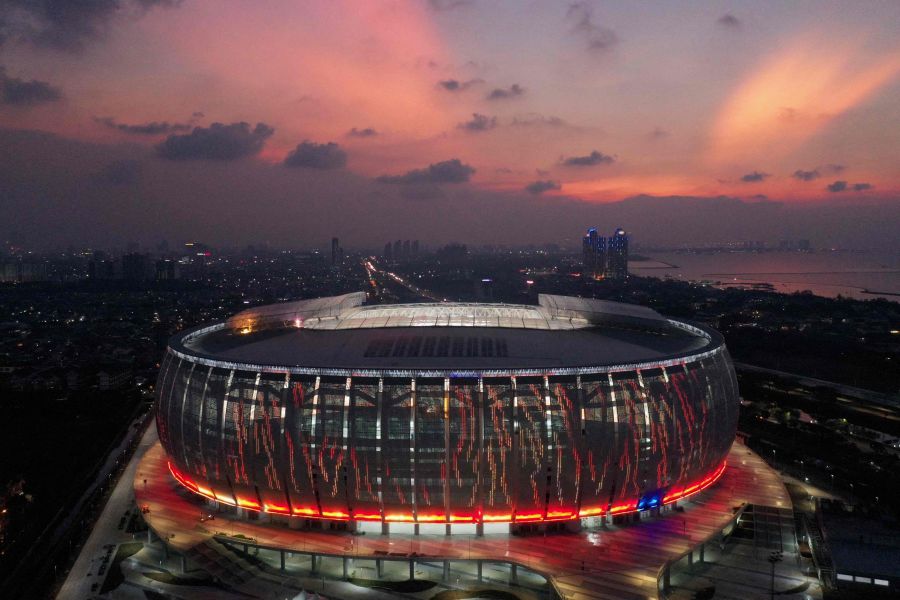This year, Jakarta's citizens will be performing Aidilfitri prayers in the newly built Jakarta International Stadium (JIS).
The governor himself will be joining the annual celebration since the capital city has eased social restrictions after two years of the pandemic.
The stadium, which was soft-launched on April 19, is considered another achievement by Governor Anies Baswedan, and perhaps even made his political opponents more envious, since he has been touted as one of the strongest candidates in the 2024 presidential race.
The soft launching of JIS was noted as a historical moment not only for Jakarta, but also for Indonesia. During the launch, spectators enjoyed an interesting world-class soccer final between Barcelona U-18 and Atletico Madrid U-18. The latter was beaten with a 1-0 score.
"JIS has proven that we are a great nation that can provide colossal global class work," Baswedan posted on Instagram.
More than just a magnificent international stadium, it is an ideal place for many other purposes. Developed through a green concept with an estimated capacity of 82,000 (slightly smaller than Kuala Lumpur's Bukit Jalil National Stadium, with a capacity of 87,411), JIS will be the first soccer stadium in Asia equipped with a retractable roof, allowing games and shows to go on uninterrupted in the event of heavy rain.
Costing 4.5 trillion rupiah (US$312 million) in city funds, JIS was built on 26.5ha of land and in compliance with FIFA standards.
With nine floors offering various facilities, upon its completion at the end of the year, this 73m-high stadium will be the largest stadium in Indonesia.
For more than 10 years, Jakarta's sports community has been waiting to get a new stadium. Jakarta lost one of its landmarks when Lebak Bulus Stadium was demolished in 2011 to be replaced by a new Mass Rapid Transit station.
No wonder that JIS has been applauded by many, including former city governor Sutiyoso.
This platinum-certified green stadium (accredited by the Green Building Council Indonesia, which is affiliated with the World Green Building Council) may be another formula to boost tourism in the capital.
"Of course, one of the measures is to manage this commercially so that it can be accounted for and, hopefully, there will be sufficient income when it is used for various activities," Baswedan said.
Baswedan is hoping that JIS will be a driving engine to revive the economy and will have an impact on the entire northern area of Jakarta.
Apart from using hybrid grass (a mixture of 95 per cent natural and five per cent synthetic grass), JIS applies pied stilt birds as an unconventional approach for field maintenance.
By letting them out each day to eat pests, these waterbirds from Boyolali (in Central Java) can be effective in maintaining the fertility of the grass without the need to use harmful pesticides.
Since becoming governor in October 2017, Baswedan envisioned that Jakarta must serve as collaborative city, with equality and social justice as its mantra, to create a better and more advanced city with happier people (Maju Kotanya, Bahagia Warganya).
To name just a few of his accomplishments, since 2018, Jakarta has built new flyovers, 241km of sidewalks, 40 playgrounds, 296 city parks, 29 urban forests and 154 green lanes, along with revitalisation of rivers, lakes and villages in slum areas.
Baswedan has also shown his eagerness to make Jakarta a world leader in public transportation by shifting the paradigm from car-oriented development to transit-oriented development.
For instance, by doubling the coverage of public transportation from 42 per cent in 2017 to 82 per cent and setting a target of operating 14,000 electric buses (or 60 per cent of the city's bus fleet) by 2030.
Albeit criticisms from his detractors, this new facility will undoubtedly help Baswedan gain more support from the people to nominate him as the ideal candidate for the 2024 presidential race.
Surveys have shown that the former education minister will be a tough contender for his competitors. Several opinion polls indicated that Baswedan competes vigorously with Defence Minister and Gerindra Party chairman Prabowo Subianto and Central Java governor Ganjar Pranowo of the ruling Indonesian Democratic Party of Struggle (PDI-P).
Amidst 41 per cent of undecided respondents, a survey by the Populi Centre in 34 provinces in Indonesia revealed that Pranowo and Baswedan have become strong contenders within the last six months since October 2020.
The Populi survey — with 1,200 respondents — conducted between March 21 and 29, 2022, showed that support for Pranowo increased from 2.6 per cent in October 2020 to 11.6 per cent in March 2022, while support for Baswedan grew from 5.5 per cent to 7.2 per cent within the same period.
The writer is an alumnus of University of Technology Sydney, Australia, and is currently teaching at the LSPR Communication and Business Institute, Jakarta
The views expressed in this article are the author's own and do not necessarily reflect those of the New Straits Times





